As a biblical word, Covenant has its origins in the Old Testament where God promises to protect his people from tyranny and slavery. In this film, directed by and even titled – Guy Ritchie’s The Covenant – the meaning of that word is explained through an unspoken bond between two men. One is a an American soldier tasked with finding and destroying munitions and IEDs (Improvised Explosive Device) in Taliban torn Afghanistan, and the other is his Afghani interpreter who is promised special US immigration visas for his service to the war effort. The promise or the covenant here is not merely the immigration visas. Through muted reactions during the film’s last two minutes, the meaning of the word Covenant is not only understood, but also felt…with goosebumps.
Before we get there, subtitles tell us that hundreds of Afghani interpreters and their families were brutally killed by the Taliban, for aiding American troops during the 20 year war that ultimately resulted in the latter’s failure to find any WMDs (Weapons of Mass Destruction). Running at little over 120 minutes, this is a Guy Ritchie film like none of his previous home grown crime and action thrillers. Even as Snatch, Sherlock Holmes and Lock, Stock And Two Smoking Barrels were his call to fame as highly entertaining British cinema, his Covenant is far from home as an American war film set in 2018. And that’s a good thing.
17 years after the fateful events of 9/11, the US Administration is no closer to victory than it was before the retaliation. Like Vietnam before, ‘ain’t-war-hell’ is the theme running amok when Master Sergeant John Kinley (Jake Gyllenhaal) and his Afghani interpreter Ahmed (Dar Salim) are the sole survivors of an ambush they saw coming. The rest is run, gun, stab, repeat, until Kinley finds himself in sweet home Santa Clarita, California. Ahmed is not. Without finger pointing, Ritchie asks difficult questions that can only have an uncomfortable answer – Was the special immigration visas for the Afghani interpreters a scam? Did they die at the hands of the Taliban because Uncle Sam looked the other way? Did the US Military leave Afghanistan worse than it already was?
While those questions pivot around the actual scenario of what may have happened in Afghanistan, Ritchie’s version has Kinley suit up for his fifth but solo tour of the Afghani Mountains; This time, to bring Ahmed and his family back with him. Until this last act, or when the film plays out like Infinity Ward’s Call of Duty: Modern Warfare, the action and story feels highly restrained. Then it goes over the top with Guy Ritchie going gung-ho with everything thrown in, AC-130 Gunship with batteries included. As the co-writer, Ritchie’s story is all over the place from a recue film, to a FPS war film, to a film about brotherhood and bonding. We’ve seen this before in the modestly budgeted, but superior buddy-cop drama with Gyllenhaal and Michael Peña in End of Watch. We’ve also seen one soldier fight off hordes of Taliban in the propaganda rife Lone Survivor. What we don’t see in Guy Ritchie’s The Covenant is Guy Ritchie’s esthetic flamboyance, lurid one-liners, and thankfully, neither Vinnie Jones nor Jason Statham making cameo appearances just because they can.
Even as clichéd as it looks and sounds, Gyllenhaal and Salim playing men from different cultures and beliefs, but bound by an unwritten code of honour, is as believable as much as it is watchable. It’s nearly impossible not to find ourselves hooked in and rooting for them to survive. In the real world they wouldn’t stand a chance. But in cinema, the mighty and the minute share the same space. In between, there can exist a measure of humanity comparable to biblical proportions.


